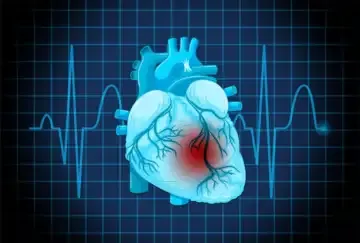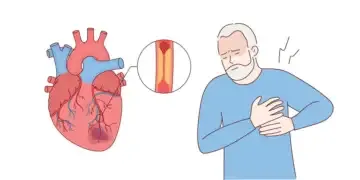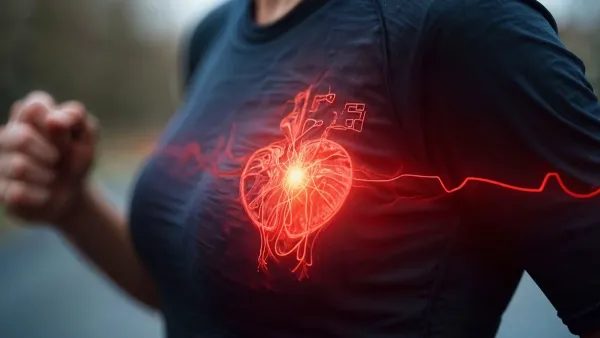This article highlights ten early indicators of stroke and outlines diagnostic tests, common symptoms, and risk factors.
Being aware of these signs and taking timely action can significantly improve recovery outcomes and help prevent life-threatening health issues. While strokes are relatively common, the body often begins to show warning signs up to a month before one occurs.
We got in touch with Dr Vipul Gupta, Director of Neurointerventional Surgery, Sir H.N. Reliance Foundation Hospital, Mumbai, who told us the signals your body may send in the weeks leading up to a stroke.
Top 6 Signs Your Body Gives You a Month Before a Stroke
Stroke remains one of the top causes of death and long-term disability across the globe. While it's often seen as a sudden and unpredictable event, the body can begin signalling trouble weeks in advance. Recognising these early symptoms and seeking timely medical care can greatly reduce the chances of a major stroke.
According to Dr Vipul Gupta, a leading expert in neurointervention, "Many people are unaware that the body may give off subtle signs nearly a month before a stroke. Being alert to these symptoms can make all the difference in early diagnosis and prevention."

Here are six key warning signs your body might show weeks before a stroke:
1) Unexplained Severe Headaches
If you're hit with a sudden, intense headache without a known trigger, especially if it's different from your usual pattern, it could signal a warning bleed in the brain or a mini-stroke. These types of headaches shouldn't be ignored.
2) Sudden Blurred or Lost Vision
A stroke can disrupt the brain's visual processing. If you notice brief episodes of blurred or missing vision in one or both eyes, it might be due to a transient ischemic attack (TIA), which serves as a critical early warning sign.
3) Speech Issues or Trouble Understanding Language
Difficulty speaking, slurred words, or struggling to comprehend conversations, even if temporary, may point to reduced blood flow to the brain. This should prompt immediate medical evaluation.
4) Numbness or Weakness on One Side
Sudden tingling, numbness, or weakness in your face, arms, or legs, particularly on just one side of the body, can be a red flag. It may feel like muscle fatigue or pins and needles, and should never be brushed off.
5) Sudden Dizziness or Loss of Balance
If you experience sudden balance issues, vertigo, or difficulty walking without explanation, your brain could be warning you of a potential stroke due to impaired blood circulation.
6) Memory Gaps or Confusion
Noticeable forgetfulness, confusion, or trouble following everyday tasks could point to reduced oxygen supply to the brain, another potential stroke indicator.
 What to Do If You Notice These Symptoms:
What to Do If You Notice These Symptoms:
These symptoms may come and go, but that doesn't mean the danger has passed. Dr. Vipul Gupta warns that such episodes are often TIAs, which frequently precede a more serious stroke. Acting quickly, seeking medical help, making lifestyle changes, and starting medications can help prevent lasting damage.
Keep the acronym FAST in mind to recognise stroke symptoms:
- Face drooping
- Arm weakness
- Speech difficulty
- Time to seek emergency care
A stroke is a medical emergency, but it's often preceded by signs that give us a chance to act. Stay alert, take symptoms seriously, and don't delay in seeking help. Your awareness could be life-saving.

 Here are six key warning signs your body might show weeks before a stroke:
1) Unexplained Severe Headaches
If you're hit with a sudden, intense headache without a known trigger, especially if it's different from your usual pattern, it could signal a warning bleed in the brain or a mini-stroke. These types of headaches shouldn't be ignored.
2) Sudden Blurred or Lost Vision
A stroke can disrupt the brain's visual processing. If you notice brief episodes of blurred or missing vision in one or both eyes, it might be due to a transient ischemic attack (TIA), which serves as a critical early warning sign.
3) Speech Issues or Trouble Understanding Language
Difficulty speaking, slurred words, or struggling to comprehend conversations, even if temporary, may point to reduced blood flow to the brain. This should prompt immediate medical evaluation.
4) Numbness or Weakness on One Side
Sudden tingling, numbness, or weakness in your face, arms, or legs, particularly on just one side of the body, can be a red flag. It may feel like muscle fatigue or pins and needles, and should never be brushed off.
5) Sudden Dizziness or Loss of Balance
If you experience sudden balance issues, vertigo, or difficulty walking without explanation, your brain could be warning you of a potential stroke due to impaired blood circulation.
6) Memory Gaps or Confusion
Noticeable forgetfulness, confusion, or trouble following everyday tasks could point to reduced oxygen supply to the brain, another potential stroke indicator.
Here are six key warning signs your body might show weeks before a stroke:
1) Unexplained Severe Headaches
If you're hit with a sudden, intense headache without a known trigger, especially if it's different from your usual pattern, it could signal a warning bleed in the brain or a mini-stroke. These types of headaches shouldn't be ignored.
2) Sudden Blurred or Lost Vision
A stroke can disrupt the brain's visual processing. If you notice brief episodes of blurred or missing vision in one or both eyes, it might be due to a transient ischemic attack (TIA), which serves as a critical early warning sign.
3) Speech Issues or Trouble Understanding Language
Difficulty speaking, slurred words, or struggling to comprehend conversations, even if temporary, may point to reduced blood flow to the brain. This should prompt immediate medical evaluation.
4) Numbness or Weakness on One Side
Sudden tingling, numbness, or weakness in your face, arms, or legs, particularly on just one side of the body, can be a red flag. It may feel like muscle fatigue or pins and needles, and should never be brushed off.
5) Sudden Dizziness or Loss of Balance
If you experience sudden balance issues, vertigo, or difficulty walking without explanation, your brain could be warning you of a potential stroke due to impaired blood circulation.
6) Memory Gaps or Confusion
Noticeable forgetfulness, confusion, or trouble following everyday tasks could point to reduced oxygen supply to the brain, another potential stroke indicator.
 What to Do If You Notice These Symptoms:
These symptoms may come and go, but that doesn't mean the danger has passed. Dr. Vipul Gupta warns that such episodes are often TIAs, which frequently precede a more serious stroke. Acting quickly, seeking medical help, making lifestyle changes, and starting medications can help prevent lasting damage.
Keep the acronym FAST in mind to recognise stroke symptoms:
What to Do If You Notice These Symptoms:
These symptoms may come and go, but that doesn't mean the danger has passed. Dr. Vipul Gupta warns that such episodes are often TIAs, which frequently precede a more serious stroke. Acting quickly, seeking medical help, making lifestyle changes, and starting medications can help prevent lasting damage.
Keep the acronym FAST in mind to recognise stroke symptoms: